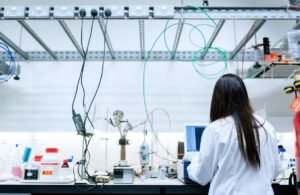Is AI Really AI?
Artificial Intelligence (AI) has become a buzzword in today’s technology-driven world, but what exactly does it mean? With numerous applications and varying degrees of complexity, AI can sometimes be misunderstood. In this article, we will explore the concept of AI, its different types, and what truly constitutes “real” AI. So, let’s delve into the world of Artificial Intelligence and separate fact from fiction.
Key Takeaways
- AI refers to computer systems designed to mimic human intelligence by performing certain tasks.
- There are different types of AI, including narrow AI and general AI.
- Real AI possesses the ability to understand, learn, and make decisions independently.
Understanding Artificial Intelligence
Artificial Intelligence is a broad term that encompasses various technologies and techniques enabling machines to perform tasks that typically require human intelligence. These tasks include visual perception, speech recognition, decision-making, and problem-solving. AI achieves these abilities by analyzing vast amounts of data, recognizing patterns, and implementing logical algorithms to provide effective solutions. Today, AI is utilized in numerous domains, ranging from healthcare to finance, revolutionizing how industries operate.
Types of AI
When it comes to differentiating AI, two common categories emerge: narrow AI and general AI. Narrow AI, also known as weak AI, refers to AI systems designed for specific tasks. These systems excel in a limited range of applications, such as virtual assistants or recommendation algorithms. On the other hand, general AI, also known as strong AI, is a hypothetical form of AI that possesses human-like intelligence. It can understand, learn, and apply knowledge across various domains. General AI is still in the realm of science fiction, and current AI systems are primarily narrow AI.
What is “Real” AI?
Real AI, as the name suggests, denotes AI systems that exhibit qualities similar to human intelligence. These systems possess the ability to perceive and understand their environment, learn from experience, and autonomously make decisions. They can adapt to new situations and solve complex problems, displaying a level of flexibility and creativity. Unlike narrow AI, real AI doesn’t require explicit programming for each specific task. Instead, it learns from data and refines its performance over time. Real AI has the potential to significantly impact industries by automating mundane tasks and augmenting human capabilities.
AI in the Real World
AI is already integrated into various aspects of our daily lives, whether we realize it or not. From personalized recommendations on streaming platforms to smart assistants like Siri and Alexa, AI technology surrounds us. Moreover, AI plays a crucial role in industries like healthcare, finance, transportation, and manufacturing, enhancing efficiency and decision-making processes. As AI continues to evolve, its impact on society is likely to grow exponentially. The future holds immense possibilities as AI continues to advance and improve our lives.
AI: Myths and Misconceptions
Despite the evident progress in AI technology, there are still common myths and misconceptions surrounding it. Let’s dispel a few of them:
- AI will replace humans: While AI can automate certain tasks, it is designed to work alongside humans, augmenting their capabilities rather than replacing them.
- AI is infallible: AI systems are only as good as the data they are trained on. Biases, errors, and limitations in training data can affect the performance and accuracy of AI systems.
- AI is all-knowing: AI is not omniscient. It relies on the data it has been exposed to and may not possess knowledge beyond its training data.
AI Ethics and Governance
As AI becomes more powerful and integrated into society, ethical considerations and governance become essential. Ensuring transparency, accountability, and fairness in AI algorithms is crucial to avoid biased outcomes, privacy violations, or unintended consequences. Governments, organizations, and experts are actively working towards establishing guidelines and frameworks to promote responsible AI development and usage. The responsible development and governance of AI are paramount to harness its benefits while minimizing potential risks.
| AI Types Comparison | |
|---|---|
| Type of AI | Description |
| Narrow AI | AI systems designed for specific tasks or domains. |
| General AI | Hypothetical AI systems with human-like intelligence across various domains. |
| AI Myths vs. Reality | |
|---|---|
| AI Myths | Reality |
| AI will replace humans | AI works alongside humans, augmenting their capabilities. |
| AI is infallible | AI systems are susceptible to biases and limitations in training data. |
| AI is all-knowing | AI’s knowledge is limited to its training data. |
| AI Applications in Industries | |
|---|---|
| Industry | AI Applications |
| Healthcare | Medical diagnosis, drug discovery, patient monitoring. |
| Finance | Fraud detection, automated trading, customer service. |
| Transportation | Autonomous vehicles, route optimization, traffic prediction. |
| Manufacturing | Process automation, quality control, predictive maintenance. |
The Future of AI
As AI technology continues to evolve, its potential for transforming various industries is immense. With advancements in machine learning, natural language processing, and computer vision, AI systems are becoming more capable and human-like. However, challenges related to ethics, privacy, and trust remain crucial considerations in its development and deployment. As we move forward, it is essential to embrace AI’s capabilities while ensuring responsible and ethical practices. The future of AI holds great promise, and its potential is limited only by our imagination.

Common Misconceptions
Misconception 1: AI is all-powerful and can do anything
- AI systems have limitations and cannot perform tasks that are outside their programmed capabilities.
- AI algorithms are only as good as the data they are trained on and might not always provide accurate results.
- AI systems lack intuition and common sense reasoning, which humans possess.
Misconception 2: AI will take over all jobs
- AI will certainly impact the job market, but not all jobs will be taken over by AI.
- AI technology is typically designed to complement human workers and augment their abilities, rather than replace them entirely.
- Certain tasks that require creativity, emotional intelligence, or complex decision-making are better suited for human workers.
Misconception 3: AI is unbiased
- AI systems are trained on data provided by humans, which can introduce biases.
- If biased data is input into an AI system, it can generate biased outputs, perpetuating and amplifying the biases.
- It is crucial to continuously monitor and evaluate AI systems to ensure they operate with fairness and accountability.
Misconception 4: AI will become sentient and take control
- AI systems do not possess consciousness or the ability to become self-aware.
- AI technology is designed to follow specific algorithms and instructions without any inherent desire or intention.
- Fears of AI taking over the world and controlling humanity are rooted in science fiction rather than current capabilities.
Misconception 5: AI is only for large corporations or tech companies
- AI is increasingly accessible and applicable to various industries and sectors, not just limited to large companies.
- Small businesses and startups can leverage AI to enhance their operations and improve efficiency.
- AI tools and platforms are becoming more user-friendly and affordable, allowing businesses of all sizes to benefit from AI technology.

AI in Daily Life
Artificial Intelligence (AI) has become an integral part of our daily lives, transforming various industries and enhancing our experiences. The table below highlights the key areas where AI is being utilized in our daily life.
| Area | Examples |
|---|---|
| Smartphones | Virtual assistants like Siri and Google Assistant |
| Communication | Automated language translation in messaging apps |
| Entertainment | AI-generated movie recommendations on streaming platforms |
| Healthcare | AI-enabled diagnosis and personalized treatment plans |
| Transportation | Self-driving cars and AI-powered navigation systems |
AI in Business
Apart from improving our daily lives, AI is revolutionizing the business landscape. The table below showcases how AI is being applied in various business sectors.
| Sector | AI Applications |
|---|---|
| Finance | Fraud detection, algorithmic trading |
| Retail | Personalized recommendations, inventory management |
| Manufacturing | Robotics process automation, predictive maintenance |
| Marketing | Customer segmentation, chatbots for customer support |
| Human Resources | Resume screening, employee engagement analysis |
AI and Job Automation
One of the most debated topics surrounding AI is its impact on job automation. The table below presents some industries with a high potential for job automation.
| Industry | Job Roles at Risk |
|---|---|
| Transportation | Truck drivers, delivery workers |
| Retail | Cashiers, stockers |
| Manufacturing | Assembly line workers, machine operators |
| Customer Service | Call center operators, ticketing agents |
| Accounting | Bookkeepers, payroll managers |
AI and Ethical Considerations
While AI offers numerous benefits, it also raises ethical concerns. The following table lists some key ethical considerations related to AI.
| Ethical Consideration | Examples |
|---|---|
| Privacy | Data collection, facial recognition |
| Bias and Fairness | Discriminatory algorithms, biased decision-making |
| Transparency | Black-box algorithms, lack of explainability |
| Job Displacement | The impact of AI on employment |
| Autonomous Weapons | The ethical implications of AI in military applications |
AI in Education
The integration of AI in education has opened up new possibilities for personalized learning and student engagement. The table below presents some AI applications in the field of education.
| Application | Examples |
|---|---|
| Virtual tutors | AI-powered tutoring platforms |
| Adaptive learning | Personalized curriculum based on student performance |
| Educational content creation | AI-generated study materials and assessments |
| Automated grading | AI-assisted grading systems |
| Student feedback | AI-driven feedback mechanisms for improvement |
AI in Healthcare Research
AI has the potential to revolutionize healthcare research, aiding in the discovery of new treatments and improving patient outcomes. The table below showcases some breakthroughs in healthcare research powered by AI.
| Research Area | AI Applications |
|---|---|
| Drug discovery | AI algorithms for efficient drug screening |
| Disease diagnosis | AI-assisted radiology image analysis |
| Patient monitoring | AI-based predictive analytics for early warning systems |
| Genomic analysis | AI algorithms for interpreting genetic data |
| Clinical trials | AI-driven patient recruitment and selection |
AI in Financial Markets
The use of AI in financial markets has led to increased efficiency and improved decision-making. The table below highlights some AI applications in the realm of finance.
| Application | Examples |
|---|---|
| Algorithmic trading | AI algorithms executing high-frequency trades |
| Risk assessment | Machine learning models predicting market volatility |
| Fraud detection | AI systems identifying fraudulent transactions |
| Portfolio management | AI-driven asset allocation strategies |
| Market analysis | AI-powered sentiment analysis of news and social media data |
The Future of AI
As AI continues to advance, its impact on various aspects of our lives is set to grow. Incorporating AI ethics and ensuring its responsible development will be crucial in harnessing the full potential of this transformative technology.
In conclusion, AI is not just a buzzword but a reality that is shaping industries, transforming businesses, and enhancing our daily lives. It brings both opportunities and challenges, from job automation to ethical considerations. The future of AI holds tremendous promise, and it is up to us to guide its path to ensure human-centric and ethical AI development for the betterment of society.
Frequently Asked Questions
Is artificial intelligence really artificial intelligence?
Yes, artificial intelligence refers to the development of computer systems capable of performing tasks that typically require human intelligence.
What are the types of artificial intelligence?
There are generally two types of artificial intelligence: narrow AI (also known as weak AI), which is designed to perform specific tasks, and general AI (also known as strong AI), which aims to possess human-like intelligence and reasoning abilities.
How does artificial intelligence work?
Artificial intelligence systems use a combination of algorithms, data, and machine learning techniques to perform tasks such as image recognition, speech recognition, decision-making, and problem-solving.
Can AI replace human workers?
While AI has the potential to automate certain tasks and improve efficiency in various industries, it is unlikely to completely replace human workers. Instead, AI is expected to complement human skills and enhance productivity.
What are the ethical concerns associated with AI?
Some ethical concerns related to AI include job displacement, privacy implications, bias in algorithms, and potential misuse of AI technologies. These issues highlight the need for responsible development, regulation, and transparency in deploying AI systems.
What are some practical applications of AI?
AI is utilized in a wide range of industries, including healthcare, finance, transportation, education, and entertainment. Some practical applications include medical diagnosis, autonomous vehicles, fraud detection, natural language processing, and recommender systems.
What is the future of AI?
The future of AI is expected to involve advancements in areas such as deep learning, reinforcement learning, robotics, and natural language processing. Integrating AI into various aspects of society will likely lead to increased automation, improved efficiency, and new opportunities for innovation.
Can AI learn and improve over time?
Yes, AI systems can utilize machine learning techniques to analyze data and improve their performance over time. This process, known as “training,” allows AI algorithms to learn from examples and adjust their behavior accordingly.
What is the Turing test?
The Turing test, proposed by British mathematician Alan Turing, is a test designed to determine if a machine can exhibit intelligent behavior that is indistinguishable from that of a human. It involves a human evaluator interacting with a machine and attempting to identify if the responses come from a human or an AI system.
Are there any limitations to AI technology?
AI technology has certain limitations, such as the inability to fully understand context, lack of common sense reasoning, susceptibility to biases in training data, and challenges in handling unexpected or novel situations. Continued research and development are focused on addressing these limitations.





